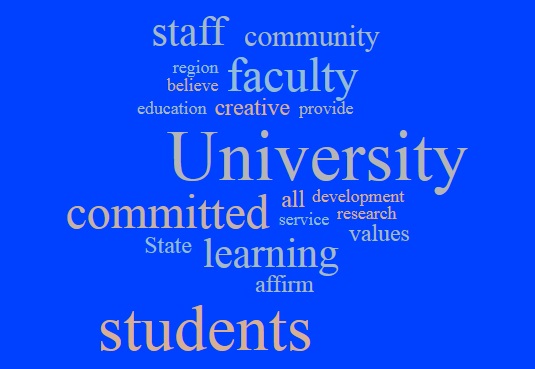PRINT AS PDF
On Tuesday, June 7, 2017, The Wall Street Journal, drawing upon Collegiate Learning Assessment+ (CLA+) exam results, published a report suggesting that “many colleges” did not improve their students’ critical thinking. The article also provided a link to results from 68 institutions. Some insights from the highest performing institutions are relevant. The following institutions made significant amounts of information available and were included in this subset: California Polytechnic State University – San Luis Obispo, California, State University – San Bernardino, Plymouth State University, the University of New Mexico, and West Chester University of Pennsylvania. This short piece notes that the success of these institutions in developing student critical reasoning skills is rooted in their basic guiding framework.
All of these institutions mission statements and most also provided vision and values statements. These defining statements typically connected the university with key external and internal stakeholders and provided descriptive variables that defined their institutions.
The related word cloud is below:
The Association of American Colleges & Universities (AAC&U) defines as critical thinking as:
Critical thinking is a habit of mind characterized by the comprehensive exploration of issues, ideas, artifacts, and events before accepting or formulating an opinion or conclusion.
The following concepts and terms are inherent in the AAC&U’s definition: ambiguity, assumptions, context, literal meaning, and metaphors. A student’s work that is at a capstone level in “Student’s Position (perspective, thesis/hypothesis)” is described in the AAC&U’s Critical Thinking Rubric as follows: “Specific position (perspective, thesis/hypothesis) is imaginative, taking into account the complexities of an issue. Limits of position (perspective, thesis/hypothesis) are acknowledged. Others’ points of view are synthesized within position (perspective, thesis/hypothesis).”
Many of the descriptive variables anchored in the high-performing institutions’ mission, vision, and values statements underpin the skills and approaches necessary to cultivate the development of critical thinking. Research is key to gaining an understanding of context and appreciation, appreciation for ambiguity, and an ability to test assumptions. Values can provide an anchor for grounding arguments and treating information with intellectual integrity. Creativity can enable one to synthesize multiple perspectives and leverage those synthesized perspectives into new insights. The entire critical thinking process is a means to learning, of which education is one specific end.
In sum, the high-performing institution’s success begins with those institution’s mission, vision, and values statements. Those documents are a starting point. They provide a foundation on which strategic planning, including planning related to academic programs and support services, is based. Consistent with empirical literature concerning high-performing organizations, strategies and tactics that are well-aligned with organizational missions and broad organizational goals can lead to sustained outstanding performance. Therefore, the success of the highlighted institutions in developing strong critical thinking skills among their students is not a matter of random chance or student body. That success is a matter of deliberate choice and institutional culture that is rooted in their mission, vision, and values statements.




